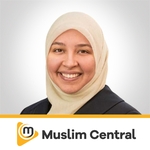Rania Awaad – Ramadan Countdown- Embracing Wings of Hope and Fear

AI: Summary ©
The conversation is about the importance of the human soul and how it is linked to various emotions and emotions. The speakers discuss the various ways in which the human soul is linked to various emotions and how they can be used to achieve their goals. They also mention the potential for experiencing emotions and emotions to be the cornerstone of one's life.
AI: Summary ©
What we should also do in one of
the most beautiful lessons we learn in Islam
is that the human being should always be
between two very important emotions, hope and fear.
Hope and fear, raja' and khawf.
We should always, and in terms of fasting,
we should look at our fast with hope
that it's been accepted and we've done the
best we can do.
And a little bit of fear and trepidation
that maybe I didn't do as well as
I should have with this day of fasting
and that tomorrow I will do better, I
will do better, I will do better.
It's beautiful.
It's like the wings of a bird, hope
and fear, that if you lose one, the
bird cannot sustain its flight.
It crashes and falls, right?
Always to be between the two emotions.
And here we ask ourself and say to
ourself, this all sounds great, Dr. Rania, this
all sounds great, but how?
How do we do this?
How do we take this journey of the
self in Ramadan?
How is it that we reach a point
that we're really reaping the full blessings of
this month as it's intended to be?
Let's look at Imam al-Ghazali and his
psychology of the self, right?
We're trying to understand our journey of the
self.
Let's look at Imam al-Ghazali and the
psychology of the self.
And Imam al-Ghazali's understanding of the human
psyche supersedes the best of what modern psychology
has come up with in explaining of the
human condition.
And I say that as a psychiatrist, that
I truly am just amazed by what Imam
al-Ghazali has come with as the framework
of the human psyche.
And so when you look at the true
genius of Imam al-Ghazali, you see here
that when he talks about the psyche, he
splits it into four domains.
The intellect, aql, the heart, qalb, the nafs,
the self, and the ruh, the spirit, or
soul.
And the spiritual heart, not the physical heart,
the one that pumps blood, but rather the
spiritual heart, the qalb, is what derives and
nourishes, or drives and nourishes our soul.
It's what seeks connection with Allah subhanahu wa
ta'ala.
And it is what has the potential to
have the most beautiful experiences and purest of
emotions.
But you see, when you don't feed your
heart, right, just like if the physical heart
was devoid of blood, it would go into
cardiac arrest and die.
The spiritual heart, when it's not being fed
properly, right, there's a huge void.
And whenever there's a void, you see these
four aspects, right, something else will come up
and try to fill the void instead.
So the first contender that comes up to
the plate, kind of waddles on up very
naively, is the physical state.
And it comes to the front line thinking
it can fill the void that you haven't
been feeding your spiritual heart with.
It's going to fill the void with what?
The physical, right, stuff.
Clothes and cars and gadgets and entertainment and
relationships and people, both actual and virtual, right,
fill it with stuff, right.
But unfortunately, the more you put in it,
it's like a bottomless cup.
The more you try to fill it, the
more that seeps out.
The more you put in, the more that
comes out.
And you can't actually fill the void truthfully
to feel the void still.
The next contender comes up, and this is
the nafs, the ego, right.
So it says, okay, the physical can't fill
it, I'm going to try.
And it wells up, right, the ego wells
up, the nafs, all your desires, right.
And when the physical wells up and the
ego wells up, it pushes the spiritual heart
out of the way.
It weakens that connection to the heart.
The connection that you could potentially feel with
Allah ﷻ, it weakens it.
And so Ramadan comes, and actually it is
the only time of the year that it
forces you to put the physical aside and
break the nafs and put that aside.
The ego goes down and the physical goes
down.
And like we said, whenever there's a void,
something else has to well up and take
its place.
But when you put down and minimize the
physical and you minimize the ego, the nafs,
the heart, right, takes its place.